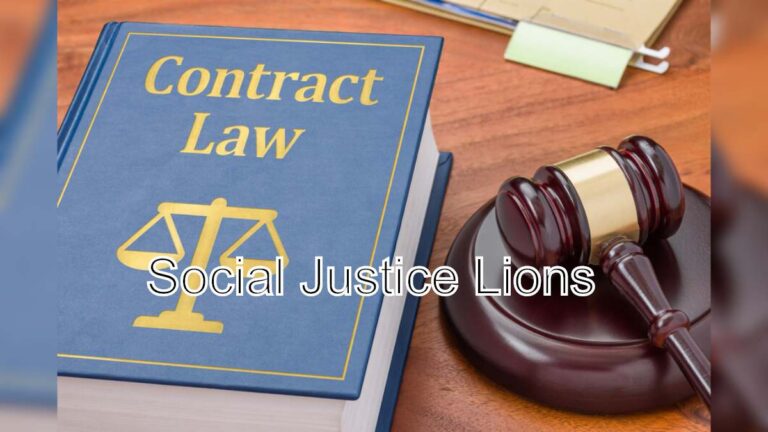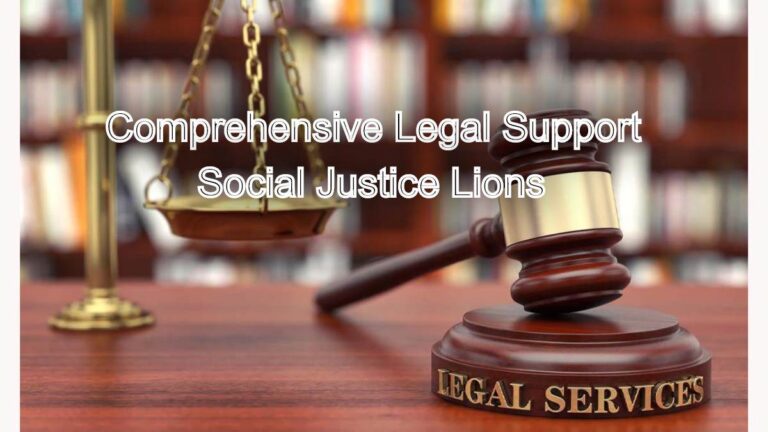Combating Employment Discrimination: We Stand with You
Combating Employment Discrimination: At Social Justice Lions, we believe in a fair and equitable workplace for everyone. Employment discrimination is a serious issue. It deprives individuals of opportunities. It undermines the principles of equality and justice. We stand firmly against all forms of employment discrimination. Our mission is to empower you. We want you to understand your rights. We are here to fight for you.
Combatting Employment Discrimination: We Stand with You: Social Justice Lions
Understanding Employment Discrimination
Firstly, let’s define employment discrimination. It happens when an employer treats an employee or job applicant unfairly. This unfair treatment is based on certain protected characteristics. These characteristics include race, color, religion, sex, national origin, age, disability, and genetic information. Moreover, some state and local laws offer even broader protections. For instance, they might include sexual orientation or marital status. Consequently, any adverse employment action based on these protected characteristics can be considered discrimination.
Adverse employment actions can take many forms. For example, it could be refusing to hire someone. Or perhaps, it might involve unequal pay for equal work. Furthermore, it could include denying promotions or training opportunities. Moreover, harassment based on a protected characteristic also constitutes discrimination. Finally, wrongful termination due to discriminatory reasons is a severe form of this injustice. Therefore, understanding the different types of discriminatory actions is crucial.
Employment discrimination is not only unethical but also illegal. Various laws at the federal and state levels prohibit such practices. These laws aim to ensure a level playing field for all individuals in the workplace.
Legal Framework Against Discrimination in India
In India, the Constitution guarantees equality and prohibits discrimination. Article 14 ensures equality before the law. Art 15 prohibits discrimination on grounds of religion, race, caste, sex, or place of birth. Art 16 guarantees equality of opportunity in matters of public employment. While there isn’t a single comprehensive law specifically addressing employment discrimination in the private sector, various statutes and judicial interpretations provide protection.
For instance, the Equal Remuneration Act, 1976, mandates equal pay for equal work for both people. The Persons with Disabilities (Equal Opportunities, Protection of Rights and Full Participation) Act, 1995 (now replaced by the Rights of Persons with Disabilities Act, 2016), prohibits discrimination against persons with disabilities in employment. Moreover, the Sexual Harassment of Women at Workplace (Prevention, Prohibition and Redressal) Act, 2013, specifically addresses sexual harassment, a form of sex-based discrimination. Furthermore, various judicial pronouncements by the Supreme Court and High Courts have interpreted constitutional principles to extend protection against other forms of discrimination in employment, even in the absence of specific legislation. Therefore, a legal framework exists to combat employment discrimination.
Types of Employment Discrimination
Several types of employment discrimination can occur in the workplace. Recognizing these different forms is the first step towards combating them.
1. Direct Discrimination
Firstly, direct discrimination happens when an employer explicitly treats an employee or applicant less favorably than others. This less favorable treatment is directly based on a protected characteristic. For example, refusing to hire a qualified candidate solely because of their race is direct discrimination. Similarly, paying a woman less than a man for performing the same job with the same qualifications is also direct discrimination. Consequently, such overt acts of discrimination are clearly illegal.
Moreover, direct discrimination can also manifest in explicit policies or rules that disadvantage individuals based on protected characteristics. Therefore, employers must ensure that their policies are neutral and do not have a discriminatory intent or effect.
2. Indirect Discrimination
Secondly, indirect discrimination occurs when a seemingly neutral policy or practice disproportionately disadvantages individuals with a protected characteristic. While the policy might appear fair on the surface, its impact creates inequality. For instance, a requirement that all employees must be able to lift 50 pounds might disproportionately exclude women or individuals with certain disabilities, even if the ability to lift that much weight is not essential for all jobs. Consequently, employers must carefully assess the potential impact of their policies and practices on different groups of employees.
Furthermore, if an employer cannot objectively justify a policy that has a discriminatory effect, it can be considered indirect discrimination. Therefore, the focus is not just on the intent but also on the outcome of the policy.
3. Harassment
Thirdly, harassment is a form of discrimination that involves unwelcome conduct based on a protected characteristic. This conduct can create a hostile work environment. It can include offensive jokes, slurs, intimidation, ridicule, insults, or other verbal or physical conduct. Sexual harassment is a specific type of harassment based on sex. It includes unwelcome sexual advances, requests for sexual favors, and other verbal or physical conduct of a sexual nature. Consequently, employers have a legal obligation to prevent and address harassment in the workplace.
Moreover, a single severe incident can sometimes be enough to create a hostile work environment. Therefore, employers must take all complaints of harassment seriously and take prompt and effective action to address them.
4. Retaliation
Fourthly, retaliation occurs when an employer takes adverse action against an employee because the employee engaged in protected activity. Protected activity includes complaining about discrimination, participating in an investigation of discrimination, or opposing discriminatory practices. For example, demoting or firing an employee shortly after they filed a complaint of racial discrimination can be considered retaliation. Consequently, laws prohibiting discrimination also protect employees from retaliation.
Moreover, retaliation can take many forms, not just termination. It can include denying promotions, giving negative performance reviews, or creating a hostile work environment in response to protected activity. Therefore, employers must ensure that they do not take any adverse action against employees who exercise their rights to oppose discrimination.
Your Rights and Legal Remedies
If you believe you have experienced employment discrimination, you have rights and legal remedies available to you. Understanding these options is crucial for seeking justice.
1. Filing a Complaint with Regulatory Agencies
Firstly, you can file a complaint with the appropriate government agency. In India, depending on the nature of the discrimination, you might approach the National Commission for Women (for sex-based discrimination), the office of the Commissioner for Persons with Disabilities, or labor departments at the state level. These agencies have the authority to investigate complaints and attempt to resolve them through conciliation or other means. Consequently, filing a complaint can be the first step in seeking redress.
Moreover, some agencies have the power to conduct formal investigations and even impose penalties on employers found to have engaged in discriminatory practices. Therefore, understanding the jurisdiction and procedures of these agencies is important.
2. Mediation and Conciliation
Secondly, mediation and conciliation are alternative dispute resolution methods. They involve a neutral third party helping the parties reach a voluntary settlement. These processes can be less adversarial and more cost-effective than litigation. Consequently, exploring mediation or conciliation can be a good option for resolving discrimination disputes.
Moreover, government agencies and private organizations often offer mediation and conciliation services. Therefore, it is worth considering these options early in the dispute resolution process.
3. Filing a Lawsuit
Thirdly, you have the right to file a lawsuit in court to seek legal remedies for employment discrimination. Depending on the specific laws violated, you can file a suit in a civil court or an industrial tribunal. Legal remedies can include monetary compensation for lost wages, emotional distress, and punitive damages. Furthermore, the court can order the employer to take specific actions, such as hiring or promoting the affected employee. Consequently, litigation can be a powerful tool for enforcing your rights.
Moreover, pursuing a lawsuit requires a thorough understanding of the relevant laws and legal procedures. Therefore, it is essential to seek the assistance of an experienced employment lawyer.
4. Seeking Injunctive Relief
Fourthly, in some cases, you can seek injunctive relief from the court. An injunction is a court order that requires the employer to stop a discriminatory practice or take specific actions to prevent further discrimination. For example, a court might order an employer to cease a policy that is found to be discriminatory. Consequently, injunctive relief can provide immediate protection against ongoing discriminatory practices.
Moreover, seeking an injunction often requires demonstrating that you will suffer irreparable harm if the discriminatory practice continues. Therefore, it is important to act promptly if you are facing ongoing discrimination.
How Social Justice Lions Can Help
At Social Justice Lions, we are deeply committed to fighting employment discrimination. We understand the complexities of these cases. We have the experience and dedication to advocate for your rights.
Firstly, we offer a confidential consultation to understand your situation. We will listen to your story carefully and provide you with an honest assessment of your legal options. Secondly, our experienced attorneys can help you gather the necessary evidence to support your claim. We will guide you through the process of documenting discriminatory incidents and identifying relevant witnesses. Thirdly, we can assist you in filing complaints with the appropriate regulatory agencies. We will ensure that your complaint is well-articulated and supported by the relevant legal arguments. Fourthly, we are skilled negotiators and can represent you in mediation or conciliation proceedings. Our goal is to reach a fair and just settlement on your behalf. Finally, if litigation becomes necessary, we are prepared to vigorously represent you in court. We will fight tirelessly to protect your rights and seek the remedies you deserve. Consequently, we are your dedicated advocates in the fight against employment discrimination.
We believe that everyone deserves to work in an environment free from discrimination. We are here to provide you with the legal support and guidance you need to challenge discriminatory practices and seek justice.
Frequently Asked Questions: Combatting Employment Discrimination
Employment discrimination occurs when an employer treats an employee or job applicant unfairly based on protected characteristics like race, gender, religion, disability, or age. This can include unfair hiring practices, unequal pay, denied promotions, harassment, or wrongful termination due to these reasons.
In India, the Constitution guarantees equality and prohibits discrimination. Specific laws like the Equal Remuneration Act, the Rights of Persons with Disabilities Act, and the Sexual Harassment at Workplace Act provide protection. You have the right to file complaints with relevant government agencies or pursue legal action in court seeking remedies like compensation and reinstatement.
Firstly, document every incident of discrimination with dates, times, witnesses, and specific details. Then, report the discrimination to your HR department or a designated internal grievance committee. Simultaneously, consider filing a formal complaint with the appropriate government agency or consulting with an employment lawyer to explore your legal options.
Relevant evidence can include discriminatory emails or memos, witness testimonies, comparative data showing unequal treatment, inconsistent application of workplace policies, negative performance reviews following a discrimination complaint, and any other documentation that supports your claim of unfair treatment based on a protected characteristic.
Social Justice Lions provides confidential consultations to understand your situation, helps gather necessary evidence, assists in filing complaints with regulatory agencies, represents you in mediation or conciliation, and offers vigorous legal representation in court to fight for your rights and seek just remedies for the discrimination you have faced.
Conclusion
In conclusion, employment discrimination is a pervasive issue that violates fundamental principles of fairness and equality. Various laws and legal remedies exist to combat this injustice. Understanding your rights and the available legal avenues is the first step towards creating a more equitable workplace. At Social Justice Lions, we stand with you. We are committed to providing you with the expert legal representation and unwavering support you need to challenge employment discrimination and achieve justice. Remember, you are not alone, and we are here to fight for your rights.







